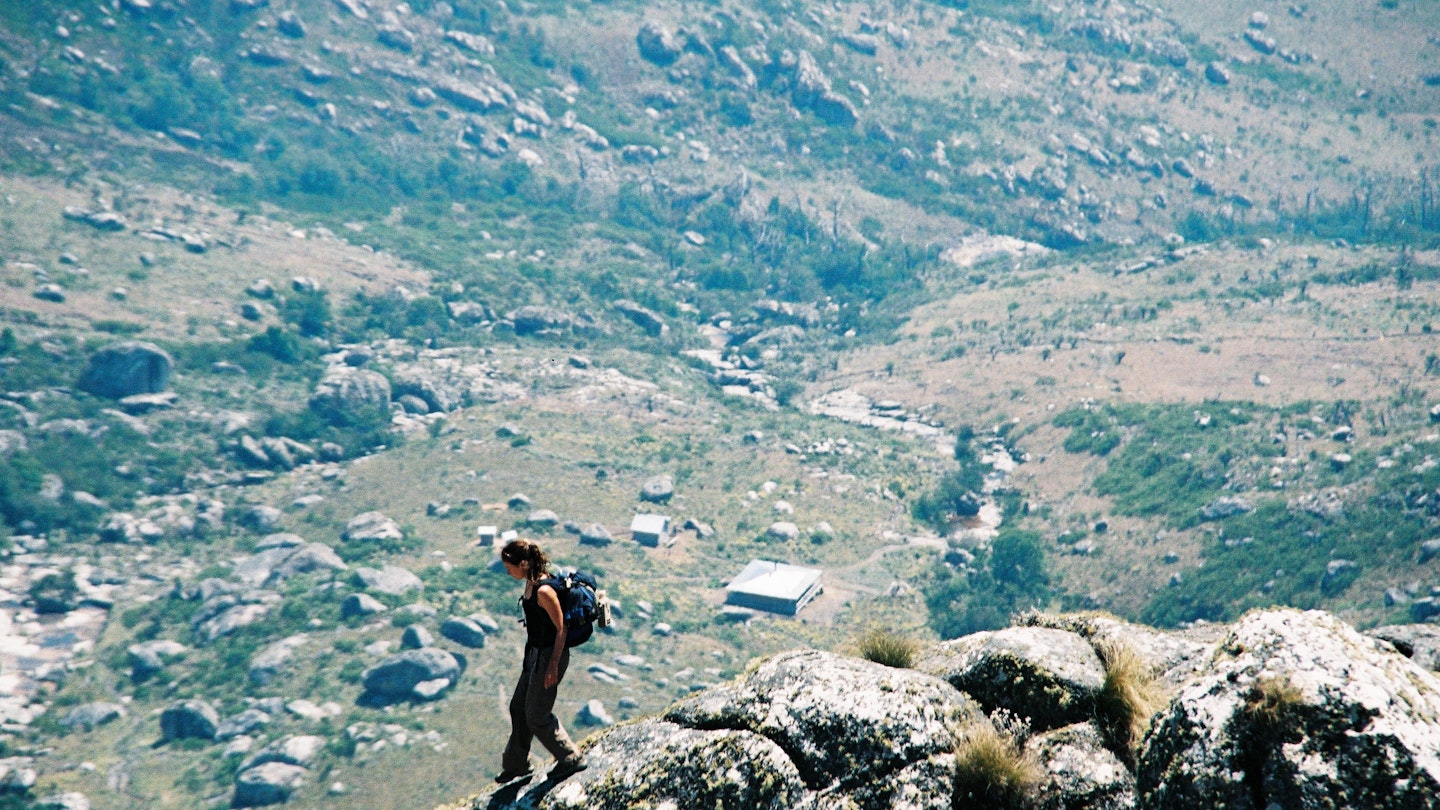Malawi offers wonderful opportunities for hiking, especially in the cooler months of April to September, when the vegetation is lush and the air fresh.
Two of Malawi’s major attractions are Mulanje, the third-highest mountain in Africa, and the Nyika Plateau in the north, where high grasslands provide epic views, pristine air, and the sight of roaming zebras. The country is home to various trails that promise proximity to wildlife along with the chance to explore rural Malawi away from major roads. While walking in the country’s majestic national parks is possible (and unforgettable!), it is advisable to have an experienced guide to navigate animal encounters safely.
From the wide Shire River and the woodlands of the Zomba Plateau to the high escarpment at Livingstonia and the depths of the Viphya Forest, these are the best hikes in Malawi.
Chambe Basin, Mulanje
Best hike for aspiring mountaineers
12km (7.5 miles); 5–6 hours; moderate
You’ll find numerous ways to hike around the mighty massif of Mulanje, which soars above the surrounding lush tea plains. At all the trailheads, you’ll encounter members of the Guides and Porters Association of Mt Mulanje, whose assistance is crucial for ensuring a safe and enjoyable excursion. These experts can share the particular legends associated with the mountain, as well as provide insights into the flora and fauna you may encounter, including the endemic scented Mulanje cedar, klipspringers, and rock hyrax.
Mulanje features 10 simple but attractive huts for accommodations. Even though these cannot be reserved in advance, “mountain rules” apply, thus ensuring no hiker is ever turned away.
Routes vary from a 4km (2.5-mile) stroll to Likhubula Falls (where a dip in the pool is highly recommended) to the challenging 3-day hike through gullies and past caves to reach jagged Chaguru Peak. The ultimate challenge is the Grand Traverse, a strenuous 5-day trek across the entire length of Mulanje Massif.
If you’re pressed for time but still wish to sample the landscapes and atmosphere of the mountain, consider hiking the Chambe Basin, which provides spectacular views of the sheer cliff faces of Chambe Mountain. The route commences at the Likhubula forestry office and follows the “skyline path” through forest and along rushing rivers to the dramatically rocky basin, overlooking the high Mulanje plateau.
Zomba Plateau
Best hike for poetry lovers
15km (9.3 miles); 6 hours; moderate
The Zomba Plateau, with its ancient forests and steep escarpments, is a haven for hikers. Located above the charming town of Zomba, it’s more accessible (though less wild) than Mulanje and is home to a rich variety of wildlife, including serval cats, bushbucks, yellow baboons, and samango monkeys. Hikers are encouraged to engage with local guides who can provide expert knowledge and assist in environmental efforts such as litter picking and trail maintenance to help prevent wildfires.
A highly recommended plateau walk leads from Ku Chawe Inn past Mulumbe peak to a natural formation known as Chingwe’s Hole. Here, you can enjoy extensive views over the Shire Valley. Local legends tell that this hollow, surrounded by ferns and moss-draped trees, is a gathering place for spirits, historically associated with tragic events involving marginalized groups.
Livingstonia Trail
Best hike for adventurers
40km (25 miles); 3 days; challenging
This adventurous expedition connects Livingstonia with Chelinda Camp on the Nyika Plateau, traversing landscapes of unforgettable wild beauty. You can hike in either direction, with arrangements for guides and accommodations made through local lodges.
From Livingstonia, the initial stop is a small cooperative in a thriving coffee-growing area. On the second day, you will cross into the Nyika park forest and start ascending the elevated plateau, characterized by vast expanses of open grassland. After an overnight wild camping experience, the hike continues across stream-crossed and orchid-dotted plains to Chelinda.
Manchewe Waterfalls
Best hike for history enthusiasts
6km (3.7 miles); 3 hours; moderate
The Manchewe Waterfalls hike can be accessed from the cluster of stunning lodges, including the standout eco-lodge near Livingstonia. Participants can arrange for a guide to navigate through the hike to the falls and back.
The journey begins at Lovers’ Rock, offering an incredible view of the falls cascading down the rock face. From there, the route descends to a concealed cave behind the waterfall, offering a unique vantage point before making the way down through narrow paths to reach the base. Swimming in the pools here is a refreshing option.
Guides often share chilling local histories about how villagers used to shelter in the cave behind the waterfall to escape from slavers who were active in the area during the 19th century.
Shire River Trail
Best hike for wildlife enthusiasts
23.6 miles (38km); 3 days; moderate
This wildlife-rich adventure begins at Mvuu Camp in Liwonde National Park. Led by experienced guides, you can expect an interactive bush walk filled with animal spotting opportunities while learning to identify tracks and understand habitats. Liwonde is renowned for its elephants, and you are also likely to observe impala, waterbuck, kudu, buffalo, warthogs, and a diverse range of birds, alongside hippos and crocodiles in the Shire River.
The first day starts at the foot of the Nafiulu Hills, leading to the banks of the Mwalasi River. The second day showcases a journey to the Shire, trekking through mopani woodlands; on the third day, the route along the Shire brings you back to Mvuu across expansive flood plains, with accommodations provided in tented camps, allowing hikers to carry only a day pack.
Viphya Forest Walks
Best hike for birdwatchers
Varied; easy to moderate
The Viphya Forest Reserve, rising from the shore of Lake Malawi to 1700m (5577ft), features high grasslands interspersed with pine plantations and indigenous forest. Local eco-lodges offer guided hikes through the enchanting greenery. Hikers can spot up to 280 bird species, including the broad-tailed warbler, Scharlow’s turaco, Bertram’s weaver, Whyte’s barbet, and the red-chested fluff-tail. Some lodges also organize meditative forest bathing experiences among fragrant pine stands.




